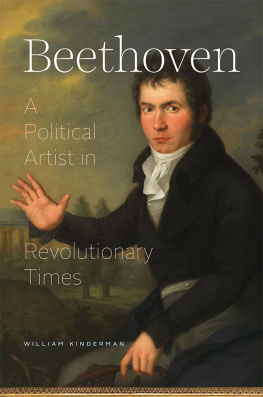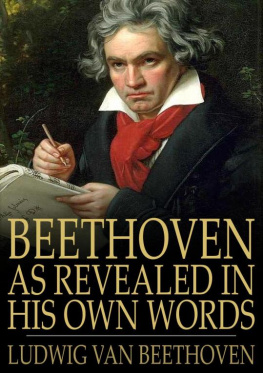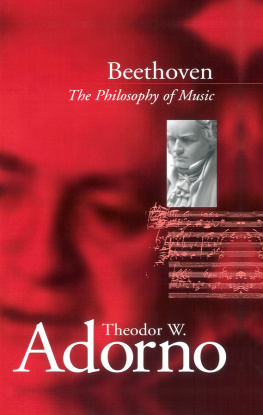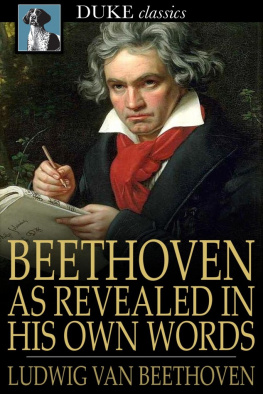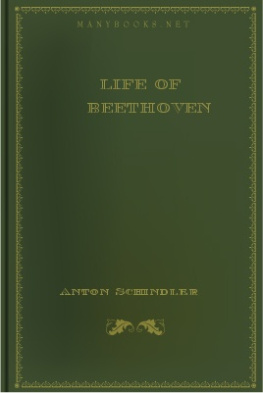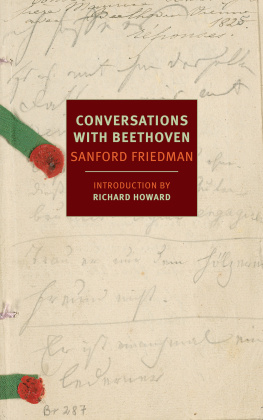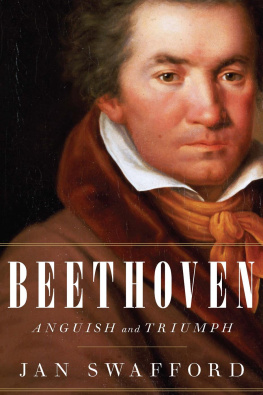William Kinderman - Beethoven
Here you can read online William Kinderman - Beethoven full text of the book (entire story) in english for free. Download pdf and epub, get meaning, cover and reviews about this ebook. year: 2020, publisher: University of Chicago Press, genre: Detective and thriller. Description of the work, (preface) as well as reviews are available. Best literature library LitArk.com created for fans of good reading and offers a wide selection of genres:
Romance novel
Science fiction
Adventure
Detective
Science
History
Home and family
Prose
Art
Politics
Computer
Non-fiction
Religion
Business
Children
Humor
Choose a favorite category and find really read worthwhile books. Enjoy immersion in the world of imagination, feel the emotions of the characters or learn something new for yourself, make an fascinating discovery.
- Book:Beethoven
- Author:
- Publisher:University of Chicago Press
- Genre:
- Year:2020
- Rating:3 / 5
- Favourites:Add to favourites
- Your mark:
- 60
- 1
- 2
- 3
- 4
- 5
Beethoven: summary, description and annotation
We offer to read an annotation, description, summary or preface (depends on what the author of the book "Beethoven" wrote himself). If you haven't found the necessary information about the book — write in the comments, we will try to find it.
Beethoven — read online for free the complete book (whole text) full work
Below is the text of the book, divided by pages. System saving the place of the last page read, allows you to conveniently read the book "Beethoven" online for free, without having to search again every time where you left off. Put a bookmark, and you can go to the page where you finished reading at any time.
Font size:
Interval:
Bookmark:
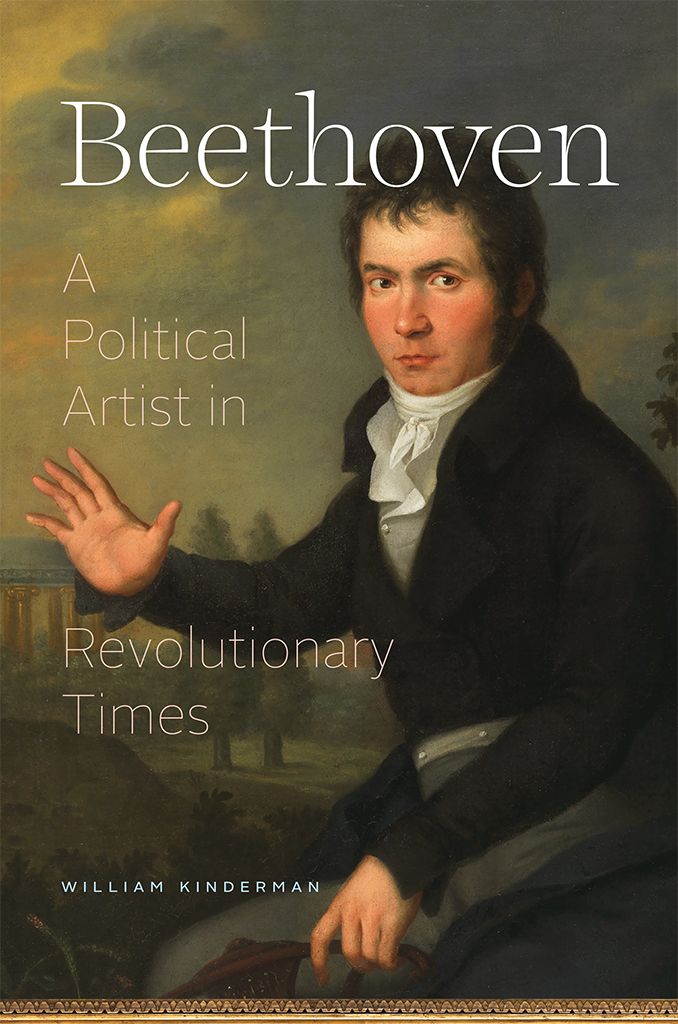
William Kinderman
The University of Chicago Press / Chicago and London
The University of Chicago Press, Chicago 60637
The University of Chicago Press, Ltd., London
2020 by The University of Chicago
All rights reserved. No part of this book may be used or reproduced in any manner whatsoever without written permission, except in the case of brief quotations in critical articles and reviews. For more information, contact the University of Chicago Press, 1427 E. 60th St., Chicago, IL 60637.
Published 2020
Printed in the United States of America
29 28 27 26 25 24 23 22 21 20 1 2 3 4 5
ISBN-13: 978-0-226-66905-2 (cloth)
ISBN-13: 978-0-226-66919-9 (e-book)
DOI: https://doi.org/10.7208/chicago/9780226669199.001.0001
Library of Congress Cataloging-in-Publication Data
Names: Kinderman, William, author.
Title: Beethoven : a political artist in revolutionary times / William Kinderman.
Description: Chicago : The University of Chicago Press, 2020. | Includes bibliographical references and index.
Identifiers: LCCN 2020032956 | ISBN 9780226669052 (cloth) | ISBN 9780226669199 (e-book)
Subjects: LCSH: Beethoven, Ludwig van, 17701827Criticism and interpretation. | Beethoven, Ludwig van, 17701827Political and social views.
Classification: LCC ML410.B42 K606 2020 | DDC 780.92 [B]dc23
LC record available at https://lccn.loc.gov/2020032956
This paper meets the requirements of ANSI/NISO Z39.481992 (Permanence of Paper).
For Daniel and Laura,
Anna and Marie
Beethoven has long been regarded as among the greatest of composers, but it has been overlooked that he was also among the most political of artists. He lived through some of the most turbulent events in European history: the French Revolution, the Reign of Terror, the rise and fall of Napoleon Bonaparte, the battles of Wagram and Leipzig, the Congress of Vienna, and the ensuing era of political repression. He depended on the generous support of aristocratic sponsors, yet smashed the bust of Prince Lichnowsky in 1806 and kept a chilly distance from the Austrian emperor Franz. Beethoven was never reconciled with the absolutist politics of the Napoleonic period or its aftermath in the Metternich regime that held power in Austria until after the composers death in 1827.
Two centuries later, Beethovens musical legacy retains an astonishing cultural presence. While we mark and move beyond the composers anniversary year 2020, a fresh investigation of the political importance of Beethovens artistic legacy seems timely. The political narratives that sustain his art contribute to its remarkable resilience. The background has to do with events much bigger than any individual. Coming of age in the progressive environment in Bonn, Beethoven enrolled in the recently founded Bonn University in 1789, just as revolution broke out in nearby France. Pursuing his musical career from 1792 in Vienna, he encountered an artistically rich yet politically reactionary situation. His risky enthusiasm for Napoleon as First Consul of the French Republic soon cooled, yet Beethoven remained fascinated by Bonaparte, and saw himself as a competitor in the cultural sphere, a Generalissimo in the realm of tones. In later years, as his access to acoustic sounds was silenced through deafness, Beethoven achieved his most enduring impact through works like the Ninth Symphony, whose origins reach back to the period of the composers youth at Bonn.
Like Mozart, Beethoven was a skilled improviser, for whom capricious spontaneity, dramatic surprise, and aesthetic risk-taking were important. Beethoven aimed to communicate teeming emotions in the here and now. The fervor of the moment, the snapshot of intense human feeling, shows every sign of being eternal. When the heroine Leonore hurls the words First kill his wife! at villainous Pizarro, or the baritone calms symphonic turbulence in the Ninth Symphony by uttering Not these tones, these gestures carry a conviction pointing beyond their immediate context, a meaning rich in implications.
How could a composer imagine effigies of the ideal (in Friedrich Schillers words) that model freedoms and social reforms, goals unlikely to be achieved in the real world, whether in the autocratic German states or the chaotic French Republic of Beethovens time, or under current conditions today? How could the Fifth Symphony help galvanize resistance to fascism, and the Sixth become a recent focus for the environmental movement?
The globalization of the world is bringing fresh recognition to this music. Much has changed since Adrian Leverkhn, the Faustian fictional protagonist of Thomas Manns Doktor Faustus, sought to revoke the promise of Beethovens Ninth. Writing in California in exile from Hitlers tyranny, Mann set his despairing message against the luminous legacy of Beethovens last symphony. As we shall see, Beethoven already anticipated this dystopian shadow as part of his project of fashioning affirmative symbols, of which the Ode of Joy is the most celebrated of all. Since then, the dream of the Ninth has encircled the globe, from massive ritual enactments in Japan to a flash mob from Sabadell, Catalonia, which has so far captured more than 90 million YouTube viewings. This exciting open-ended trajectory is an outcome of our tale, a very human story touched by pain and sacrifice, fortitude and courage.
Something revolutionary lurks in the music!
This response to Beethoven allegedly stems from the Austrian monarch who reigned during the entire period of the composers residence at Vienna from 1792 until 1827. Emperor Franz sensed something in Beethovens music that he found suspicious and that aroused his distrust. The original German formulation, Es steckt was revolutionres in der Musik!, points to a quality lodged in the music that disquieted him.
The emperor was alert to such resonances. Emperor Franz was the nephew of Marie Antoinette, an Austrian archduchess before she became queen of France as the spouse of King Louis XVI. By 1793, four years after the outbreak of the French Revolution and soon after Beethovens arrival in Vienna, Louis XVI and Marie Antoinette had been imprisoned and then decapitated by guillotine at Paris. Following these events, the utmost priority for Emperor Franz during his reign was to prevent any such revolution in Austria.
With stubborn tenacity, Franz eventually outlasted his more brilliant French political rival, Napoleon Bonaparte. Unlike the hereditary Austrian emperors, Bonaparte came from modest circumstances and rose through the ranks during the decade of upheaval following the French Revolution in 1789. Achieving prominence through his remarkable success as a military commander, Napoleon became First Consul of the French Republic in 1799.
At that time, Beethoven fervently hoped that the French leader would exert a positive political and cultural influence. No such sanguine expectations were realistic in Austria. Unlike his predecessor Emperor Joseph II during the 1780s, Emperor Franz was not a progressive leader, and he felt threatened by Napoleons social and political reforms. It has been observed that by 1794, Franzs dread of democracy became pathological, and so did his animosity to change of any sort. Another historian described how the emperor detected conspiracy everywhere as his anxieties about revolution turned into institutionalized paranoia.
Next pageFont size:
Interval:
Bookmark:
Similar books «Beethoven»
Look at similar books to Beethoven. We have selected literature similar in name and meaning in the hope of providing readers with more options to find new, interesting, not yet read works.
Discussion, reviews of the book Beethoven and just readers' own opinions. Leave your comments, write what you think about the work, its meaning or the main characters. Specify what exactly you liked and what you didn't like, and why you think so.

